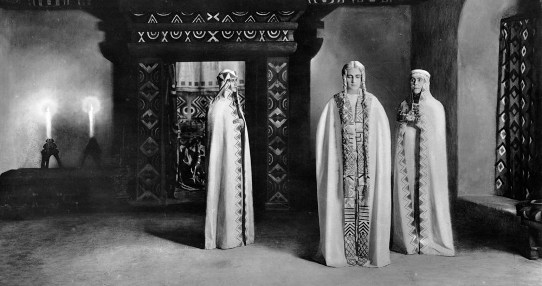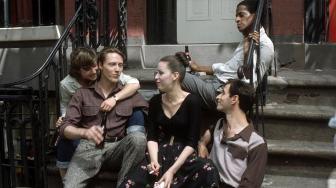 Fritz Lang adapted the medieval German epic into this awe-inspiring two part spectacle, one of the great achievements of the silent film era.
Fritz Lang adapted the medieval German epic into this awe-inspiring two part spectacle, one of the great achievements of the silent film era.
After the success of the massive two-part crime film Dr. Mabuse in 1922, Fritz Lang and screenwriter Thea von Harbou, now husband and wife, embarked on an even more ambitious project, an adaptation of the German national epic Die Nibelungen. Two years were spent in preparation, and shooting took nine months, which was a huge amount of time to make a film in those days.
Once again, the result was a two-part film. Part One (Siegfried) tells of the warrior Siegfried’s wooing of the Burgundian princess Kriemhild, his services to her brother King Gunther in winning the warrior queen Brunhild, and his betrayal and death through the spite of Brunhild and the machinations of the King’s favorite knight, Hagen. Part Two (Kriemhild’s Revenge) tells of Kriemhild’s marriage to the barbarian king Etzel, and how she lures her brothers and Hagen to her court in Hungary in order to exact a bloody revenge for the death of Siegfried.
Those familiar with the 12th century poem will notice that the film is almost totally faithful to its source. With only minor added dramatic flourishes, Lang and von Harbou succeeded in transforming the entire story, with its major and minor characters, into a magnificent visual spectacle. Most importantly, the picture recreates the awesome, elemental feeling of the epic, through an astonishing production design and a brilliant dramatic and visual strategy emphasizing the story’s mythic elements through monumentalism and highly stylized acting.
The two parts combined have a running time of almost five hours, but the movie is never dull. At this point, Lang knew how to tell a story primarily through images—gone are the lengthy intertitles that plagued Dr. Mabuse. The huge sets have an abstract quality that aids the picture’s mythic, timeless mood. Every scene is carefully composed to convey a particular spatial sense. It’s amazing how Lang is able to make the material dramatic without ever shrinking the characters into mere individuals who have motives or psychology. These are larger-than-life emblems of human passion and struggle, and yet the film’s dynamism maintains its spell, keeping the action gripping and involving. The actors were somehow coaxed into performances that matched their gigantic surroundings. Best is Margarete Schön as Kriemhild, especially in her later incarnation as avenging angel, when she is positively scary.
Die Nibelungen has had a controversial reputation among film critics and historians, some of whom see it as an example of a “fascist” style in filmmaking. But this is a tragic story where greed and envy lead to crime, which then leads to a cycle of vengeance that destroys everyone—hardly the celebration of victory that a nationalist ideology would be looking for. This film is truly one of the most impressive achievements of the silent era—an unforgettable, spellbinding experience.

Next Stop, Greenwich Village, a 1976 film written and directed by Paul Mazursky, is a finely observed autobiographical portrait of youth in its first...

Gravity, directed by Alfonso Cuaron, steps away from the Star Trek / Star Wars type outer space film we’ve become used to, with their...

A screenwriter couple’s stay on Ingmar Bergman’s home island of Fårö inspires an honest look at how women are represented in movies, in the...